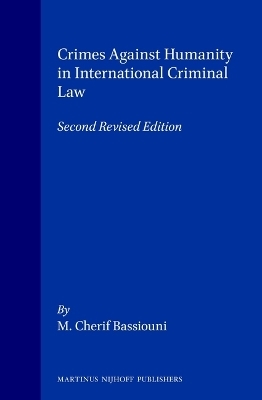
Crimes Against Humanity in International Criminal Law
Second Revised Edition
Seiten
1999
|
2nd New edition
Kluwer Law International (Verlag)
978-90-411-1222-4 (ISBN)
Kluwer Law International (Verlag)
978-90-411-1222-4 (ISBN)
In this revised edition, Professor Bassiouni establishes the legal validity of the Nuremberg Charter and describes the evolution of "crimes against humanity" from 1945 to the 1998 ICC Statute. The book's comprehensive historical and legal analysis starts with the origins of this crime in the international regulation of armed conflicts and covers the Nuremberg, Tokyo and Allied Prosecutions after World War II, and subsequent national prosecutions, as well as the Statutes of the ICTY, ICTR and their jurisprudence, and the Statute of the ICC. The Nuremberg Charter first established "crimes against humanity" in positive international criminal law, but it raised lingering legal issues. The book examines the ten different international legal formulations which were developed at that time, particularly their overlap with genocide and war crimes, and sorts out the confusion regarding the legal characteristics of this crime.
The analysis of all relevant legal issues includes: principles of legality; criminal responsibility for decision-makers and others; command responsibility; obedience to superior orders and other defences; specific contents and their counterpart in national laws; policy considerations; and the applicability of this crime to non-State actors. The amount of information and detailed discussion of international and national prosecutions and their failures make a compelling case for more effective enforcement in the future. The author brings to this book his practical experiences as Chairman of the UN Commission that investigated these crimes in the former Yugoslavia, and as Chairman of the ICC's Drafting Committee in Rome.
The analysis of all relevant legal issues includes: principles of legality; criminal responsibility for decision-makers and others; command responsibility; obedience to superior orders and other defences; specific contents and their counterpart in national laws; policy considerations; and the applicability of this crime to non-State actors. The amount of information and detailed discussion of international and national prosecutions and their failures make a compelling case for more effective enforcement in the future. The author brings to this book his practical experiences as Chairman of the UN Commission that investigated these crimes in the former Yugoslavia, and as Chairman of the ICC's Drafting Committee in Rome.
Preface. Acknowledgments. Introduction. Table of Abbreviations. 1. Emergence in Positive International Criminal Law. 2. Sources: The Law of Armed Conflicts. 3. Threshold Issues of Legal Philosophy. 4. Principles of Legality and the Law of the Charter. 5. Post-Charter Legal Developments. 6. The International or Jurisdictional Element. 7. The Method of Identifying Specific Contents and the Contents of the Specific Crimes Formulated in the Charter and in Subsequent Formulations. 8. Ratione Personae and Elements of Criminal Responsibility. 9. Defenses and Exonerations. 10. Individual Criminal Responsibility and International Prosecutions. Concluding Assessment.
| Erscheint lt. Verlag | 1.7.1999 |
|---|---|
| Verlagsort | Zuidpoolsingel |
| Sprache | englisch |
| Maße | 155 x 235 mm |
| Gewicht | 1134 g |
| Einbandart | gebunden |
| Themenwelt | Recht / Steuern ► EU / Internationales Recht |
| Recht / Steuern ► Öffentliches Recht ► Völkerrecht | |
| ISBN-10 | 90-411-1222-7 / 9041112227 |
| ISBN-13 | 978-90-411-1222-4 / 9789041112224 |
| Zustand | Neuware |
| Informationen gemäß Produktsicherheitsverordnung (GPSR) | |
| Haben Sie eine Frage zum Produkt? |
Mehr entdecken
aus dem Bereich
aus dem Bereich


